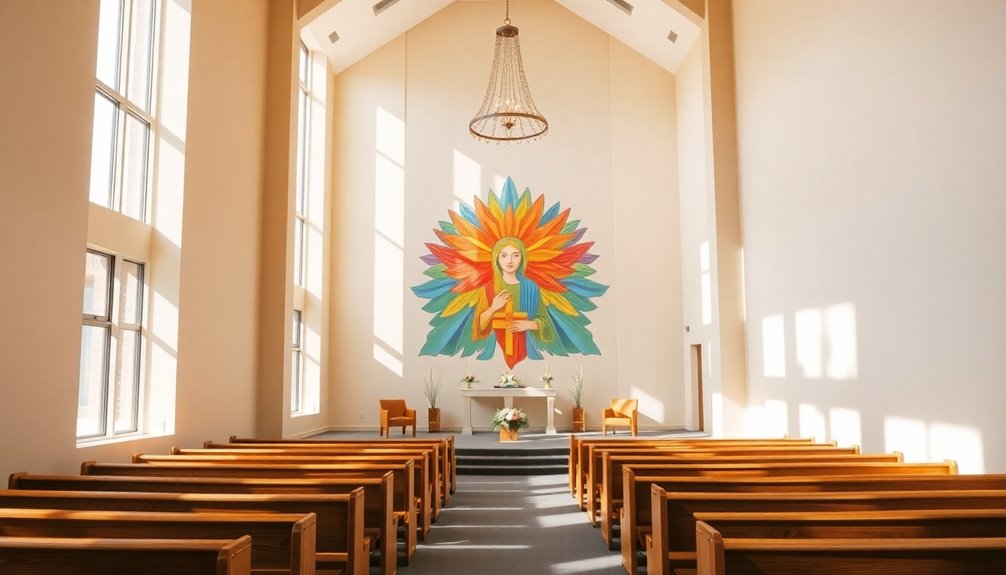Small groups are the heart of your church community and discipleship journey. They provide a space for honest conversations, deep relationships, and mutual support that often get lost in larger gatherings. Through small groups, you grow spiritually, develop leadership skills, and hold each other accountable. These groups make faith personal and impactful, strengthening your connection with God and others. Keep exploring how small groups can transform your church experience and deepen your faith.
Key Takeaways
- Small groups foster authentic fellowship, strengthening personal connections and creating a supportive church community.
- They serve as vital spaces for leadership development and active participation in ministry roles.
- Small groups promote discipleship through accountability, biblical study, and spiritual growth encouragement.
- They cultivate a sense of belonging, trust, and shared faith, enriching church life beyond Sunday services.
- These groups inspire ongoing spiritual transformation and deepen faith through intentional relationships.

Have you ever wondered how small groups can transform your church experience? These intimate gatherings aren’t just about meeting weekly; they serve as essential hubs for fellowship opportunities and leadership development. When you become part of a small group, you open yourself up to genuine connections with others who share your faith and struggles. It’s in these close-knit settings that you find support, encouragement, and a sense of belonging that can sometimes get lost in larger church services. As you gather regularly, you develop friendships rooted in trust and shared spiritual growth, making your church community feel more personal and impactful.
Fellowship opportunities within small groups create space for honest conversations and meaningful relationships. You’ll find yourself sharing life stories, praying for one another, and celebrating milestones together. This kind of authentic fellowship builds a strong foundation of mutual care, which is essential for spiritual health. As you invest in these relationships, you realize that church isn’t just a Sunday event; it’s a continuous journey of walking alongside others through life’s joys and challenges. These connections often become a source of strength, resilience, and accountability, helping you stay committed to your faith and personal growth.
Authentic fellowship nurtures mutual care, strengthening your faith journey beyond Sunday services.
Small groups are also excellent environments for leadership development. When you participate actively, you’re encouraged to take on responsibilities—whether it’s leading a discussion, organizing service projects, or mentoring newer members. These opportunities allow you to cultivate skills like communication, empathy, and organization, all of which are transferable beyond the church setting. As you step into leadership roles, you gain confidence and a clearer understanding of your spiritual gifts. Many find that small groups serve as training grounds for future leadership within the broader church community, equipping you to serve more effectively and with greater purpose.
Moreover, the intimate setting of a small group fosters personal accountability and discipleship. You’re not just passively absorbing sermons; you’re actively applying biblical principles to your daily life. This close interaction with others helps you stay committed to your spiritual journey, as you’re challenged and encouraged in a more personalized way. Over time, these experiences deepen your faith and sharpen your understanding of Scripture. The growth you experience isn’t isolated—it’s contagious, inspiring others in your group to pursue a stronger relationship with God. Additionally, understanding the importance of color accuracy and contrast ratios in visual content can mirror the clarity and depth needed in your spiritual growth, emphasizing how precision and intentionality enhance both visual and personal development.
Frequently Asked Questions
How Do I Start a Small Group if I Have No Experience?
To start a small group with no experience, begin by finding leadership among trusted friends or church members who share your vision. Choose a comfortable, accessible location like your home or a local cafe. Invite people through personal connections and church announcements. Keep it simple, focus on building relationships, and be open to learning as you go. Your enthusiasm and willingness to serve will inspire others to join and grow together.
What Topics Are Best for Small Group Bible Studies?
You should choose topics that encourage deep engagement with Scripture, like theological applications that challenge your group’s understanding and personal testimonies that foster authentic sharing. Focus on passages that inspire discussion and growth, such as Jesus’ teachings or Paul’s letters. These topics promote spiritual maturity, accountability, and connection, helping everyone apply God’s Word practically in their lives while sharing their unique faith journeys.
How Can Small Groups Accommodate Different Age Groups?
Your small group can accommodate different age groups by intentionally promoting age diversity, which sparks unique perspectives. You should plan activities that appeal to all ages, balancing energetic games for youth with reflective discussions for adults. Incorporate varied teaching styles and flexible schedules to engage everyone. By embracing age diversity and thoughtful activity planning, your group becomes a vibrant, unified community where every generation feels valued and connected.
What Are Common Challenges Faced by Small Groups?
You might face challenges like conflict resolution and leadership development within your small group. When disagreements arise, addressing them promptly and openly helps maintain unity. Developing leaders ensures your group stays strong and continues to grow. Balancing these aspects requires patience and intentional effort, but it fortifies your community. By fostering open communication and nurturing emerging leaders, you create a healthier, more resilient small group that supports everyone’s spiritual growth.
How Do Small Groups Impact Church Growth and Outreach?
They say “birds of a feather flock together,” and small groups boost your church’s growth and outreach by creating tight-knit communities. As you participate, you foster spiritual growth and build genuine connections, making it easier to invite others. Small groups serve as powerful catalysts for outreach, expanding your church’s reach and impact. Together, you can strengthen faith and attract new members, fueling both individual and collective spiritual journeys.
Conclusion
As you step into a small group, imagine yourself gathering around a warm, flickering campfire, where each flame represents a story, a struggle, or a breakthrough. This intimate circle becomes your sanctuary, fueling your faith and forging unbreakable bonds. Remember, it’s within these cozy corners that true discipleship blooms—where hearts are ignited and lives are transformed. Embrace the warmth and intimacy, and let your small group be the guiding light on your spiritual journey.










